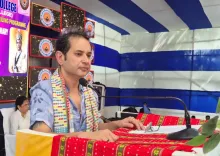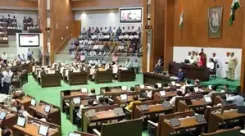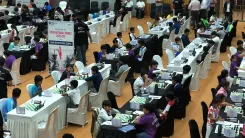Will the Fresh WBSSC Recruitment Exam Today End the Fiasco or Create a Greater Mess?

Synopsis
Key Takeaways
- The WBSSC recruitment exam is a critical step towards filling teaching vacancies.
- Transparency in the recruitment process is essential to combat corruption.
- Concerns regarding 'tainted' candidates could lead to legal challenges.
- Historical corruption issues raise doubts about the current administration's integrity.
- A comprehensive approach is needed to ensure a fair recruitment process.
Kolkata, Sep 7 (NationPress) The initial phase of the written examination for new recruitment of teaching positions in state-run schools in West Bengal is set to take place on Sunday. This is aimed at filling the vacancies resulting from the Supreme Court's decision earlier this year to terminate 25,753 teachers. A pressing concern among state officials is whether this new examination will resolve the ongoing chaos or if it could lead to even more complications in the future.
The second phase of the written examination is scheduled for September 14.
With just hours remaining before the first phase begins, many are questioning if this new recruitment effort will be conducted transparently or if the shadow of past recruitment irregularities will loom large again.
Opposition figures, such as Jagannath Chattopadhyay, the BJP’s state general secretary in West Bengal, argue that the fresh recruitment exam will occur under the same corrupt administration that oversaw the irregularities in 2016. This led to the cancellation of the entire panel by both the Calcutta High Court and the Supreme Court.
“Given that the administrative system remains unchanged, what assurance do we have that this new recruitment process will be free from corruption and transparent?” he questioned.
The Chairman of the West Bengal School Service Commission (WBSSC), Siddhartha Majumdar, assured the media on Saturday night that the upcoming examinations on Sunday and September 14 will be meticulously organized, leaving no room for malpractice.
Academics like economist P.K. Mukhopadhyay express concerns that, based on previous experiences related to the cash-for-school-job scandal, the groundwork for irregularities was laid prior to the examination, with implementation following afterwards.
“Creating a watertight examination system is only a fraction of the whole process. Who will ensure that pre- and post-examination irregularities are avoided?” he asked.
Another significant concern is whether this new written examination will face legal challenges in the future.
There are worries that “tainted” candidates could participate in the test, fueled by skepticism surrounding the authenticity of the WBSSC's recently published list of “tainted” candidates. Legal experts and central investigation officials have raised doubts about whether the list was intentionally shortened to shield additional “tainted” candidates or to minimize the actual proceeds from the cash-for-school-job scandal.
Currently, only 1,806 candidates identified as ‘tainted’ by the commission are barred from taking the written examination for the new recruitment. However, if even one candidate identified as tainted is found among those participating, the examination could face further legal disputes.
According to former Calcutta High Court judge and BJP Lok Sabha member Abhijit Gangopadhyay, the true number of tainted candidates is likely closer to 6,000.
He asserts that the WBSSC’s recently disclosed figure of 1,806 is understated, as there are four distinct categories of tainted candidates who secured jobs through illicit means.
These categories include individuals who obtained positions without taking the written examination, those who submitted blank answer sheets, candidates whose OMR sheets were altered to inflate scores, and those recruited from expired panels.
Thus, when considering all four categories, Gangopadhyay estimates that the real number of tainted candidates exceeds 6,000.
Senior advocate and CPI(M) Rajya Sabha member Bikas Ranjan Bhattacharya, who has been involved in various legal battles over this issue, concurs with Gangopadhyay’s assessment.
“Based on my experience with similar cases, I believe the actual number of tainted candidates is likely 6,000 or more. The state government and the commission appear to aim to protect as many tainted candidates as possible, using various tactics, as evidenced by the most recent list of just 1,806,” Bhattacharya stated.
Both the Supreme Court and the Calcutta High Court have firmly opposed the participation of candidates identified as having paid for their positions.
Recently, a group of “tainted” candidates whose names appeared in the WBSSC's list sought permission from the Calcutta High Court to take part in the new recruitment examination. However, their petitions were rejected by both a single-judge bench and a division bench of the court.







